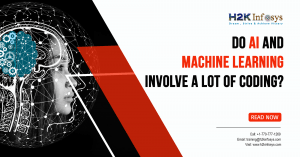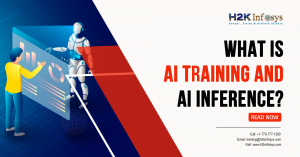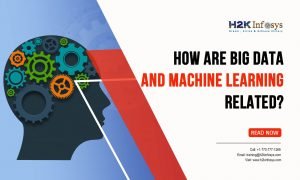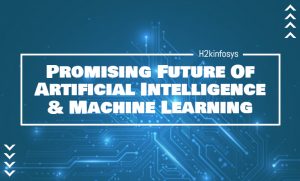Introduction: AI Is Changing the World, But at What Cost?
Artificial Intelligence is no longer the future. It’s the present. From personalized recommendations to autonomous vehicles and smart diagnostics, AI is transforming how we live and work. But as AI systems become more powerful, questions about responsibility, fairness, transparency, and societal consequences rise.
This brings us to the critical concept of AI Ethics and Societal Impact, a cornerstone topic covered extensively in our Artificial Intelligence course online at H2K Infosys. If you’re considering an AI training program that’s not just about coding but also about real-world implications, this is your starting point.

What Are AI Ethics and Societal Impact?
AI Ethics involves the moral principles and responsible practices guiding the design, development, and deployment of AI technologies. It deals with key issues like bias, accountability, data privacy, transparency, and human-AI interaction.
Societal Impact looks at the broader consequences AI has on jobs, education, governance, healthcare, and social inequality.
Together, AI Ethics and Societal Impact help us assess not just what AI can do, but what it should do.
Why AI Ethics and Societal Impact Matter More Than Ever
- Bias in AI Systems
When AI learns from biased data, it replicates those biases. Facial recognition systems have shown higher error rates for people of color. This can lead to wrongful arrests or systemic exclusion in job hiring platforms. - Transparency and Accountability
Who is responsible when an autonomous vehicle causes an accident? Lack of transparency in AI decision-making, often called the “black box” problem, makes accountability murky. - Privacy Concerns
AI systems process huge volumes of personal data. Without ethical boundaries, this could lead to data misuse, surveillance, or identity theft. - Impact on Employment
Automation is displacing routine jobs. This has a ripple effect on income inequality and job market readiness. Understanding this societal impact helps us create AI solutions that augment human roles rather than replace them.
By addressing these challenges through AI Ethics and Societal Impact, we ensure AI development aligns with human values.
Real-World Case Studies in AI Ethics and Societal Impact
Let’s look at some real-world scenarios that highlight the importance of ethical AI:
1. Healthcare and Diagnostic Algorithms
AI systems now help detect diseases like cancer or diabetic retinopathy. However, training these models on non-diverse patient data has led to diagnostic inaccuracies in underrepresented populations.
Takeaway: Ethical practices ensure data diversity and clinical validation before deployment.
2. Facial Recognition and Law Enforcement
Governments have adopted facial recognition for surveillance. Studies show the technology often misidentifies individuals from minority backgrounds, resulting in civil rights violations.
Takeaway: Societal impact analysis is crucial to prevent misuse and protect democratic freedoms.
3. Loan Approvals in Finance
Some banks use AI to screen loan applicants. If trained on biased historical data, AI might deny loans unfairly based on gender or ethnicity.
Takeaway: Ethical auditing of algorithms can reduce discriminatory practices and promote fairness.
All these cases underline how vital AI Ethics and Societal Impact are for responsible AI deployment.
How AI Courses with Placement Address Ethics and Impact
At H2K Infosys, our AI courses with placement integrate ethics into every technical module. Here’s how we make this practical:
Real-World Projects with Ethical Frameworks
Students work on capstone projects that include mandatory ethical assessments, like bias testing and stakeholder analysis.
Curriculum Focus on Societal Impact
Modules go beyond code. We discuss how AI affects the economy, social structures, and environmental sustainability.
Case Study Analysis
We provide case studies where learners assess real ethical dilemmas and propose actionable solutions, bridging classroom theory with real-world consequences.
Regulatory and Compliance Awareness
We educate learners about legal standards like GDPR and AI Act proposals to ensure global compliance readiness.
By combining tech skills with ethical reasoning, our Artificial Intelligence certification online produces professionals who are not just AI developers, but responsible innovators.
Industry Trends Supporting AI Ethics and Societal Impact
1. Global Regulation is Catching Up
Governments and international bodies like the EU are drafting AI legislation focused on transparency, fairness, and human oversight. Ethical skills are becoming just as important as technical ones.
2. Rise of Responsible AI Roles
Companies are now hiring AI Ethics Officers and Responsible AI Engineers. This opens up new job opportunities for professionals who understand AI Ethics and Societal Impact.
3. Investor and Consumer Awareness
Ethical lapses in AI systems can damage brand reputation. Companies are now investing in ethical AI development to build public trust.
According to a 2024 Deloitte report, 78% of companies with AI systems plan to increase their ethical AI budgets over the next two years.
What You’ll Learn in Our Artificial Intelligence Course Online
Our Artificial Intelligence course online is designed to create well-rounded AI professionals. Here’s what you’ll gain:
Core Technical Modules
- Machine Learning
- Deep Learning
- Natural Language Processing
- Neural Networks
Ethical AI and Societal Topics
- Bias detection in data
- Responsible algorithm design
- Ethical risk analysis
- Human-in-the-loop systems
- Global regulations and governance
Industry-Relevant Skills
- Real-world project execution
- Interview preparation
- Resume building
- Access to our job placement network
If you’re looking for an AI training program that offers technical mastery and ethical competence, this is it.
Tools and Techniques for Ethical AI Development
We introduce learners to the following tools and best practices:
Fairness and Bias Tools
- IBM AI Fairness 360 Toolkit
- Google’s What-If Tool
- Fairlearn for fairness-aware modeling
Explainability Tools
- SHAP (SHapley Additive exPlanations)
- LIME (Local Interpretable Model-Agnostic Explanations)
Compliance Checklists
- Risk assessment templates
- Audit logs
- Ethical project planning sheets
These tools help learners ensure that every project reflects a deep understanding of AI Ethics and Societal Impact.
Step-by-Step Guide: How to Design an Ethical AI Model
Here’s a simplified workflow that our students practice:
- Define the Use Case
Choose an AI problem with social relevance (e.g., disease prediction, job applicant screening). - Collect Diverse Data
Ensure data includes all genders, races, and income groups to avoid biased training. - Apply Bias Detection Tools
Use tools like AI Fairness 360 to evaluate if predictions are skewed. - Build Transparent Models
Use explainability techniques to help users understand why AI makes certain decisions. - Test Societal Impact
Conduct scenario testing to simulate how AI affects different demographic groups. - Integrate Human Oversight
Include mechanisms for human intervention, especially in high-stakes decisions.
This hands-on guide prepares learners to apply AI Ethics and Societal Impact principles in real business environments.
Key Takeaways: Why You Should Care About AI Ethics and Societal Impact
- It Builds Trust: Ethical AI systems gain user trust and regulatory approval.
- It Enhances Career Value: Employers now demand professionals skilled in ethical AI development.
- It Shapes the Future: Every AI product you build impacts society, positively or negatively.
Joining an Artificial intelligence certification online that includes ethical training is no longer optional, it’s essential.
Conclusion:
The future of AI doesn’t just depend on better algorithms, it depends on better humans designing them. At H2K Infosys, we don’t just teach you to code. We teach you to think, question, and build responsibly.
Enroll today in our Artificial Intelligence course online to gain real-world skills and make a meaningful impact. Join our AI training program and start your career with placement support and purpose.


























